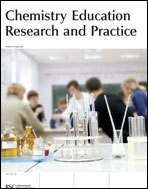GROUP DISCUSSIONS AS A TOOL FOR INVESTIGATING STUDENTS' CONCEPTS
Abstract
Learning chemistry, i.e. acquiring and changing chemical concepts, is a complex process. Investigating these processes is a complex task. Therefore, a variety of methods is necessary to provide relevant research results. The present paper explores the possibility of conducting discussions with entire chemistry classes in such a way that students are given a stronger role. The investigation tries to develop a structure for group discussions, guidelines for the role of the host as well as for the analysis of the discussions, and examples for stimuli that give students ample opportunity to discuss chemical concepts. To develop the method, a cyclical research design was adopted. Six groups of high school students participated. The discussions were videotaped and discussed within the team of researchers. The results are a number of principles for the structure of group discussions, for the role of the host, the tasks presented to the participants and the analysis of the videotaped discussions. The principles are illustrated using examples from the discussions. It emerged that students are ready to talk about chemical problems. In the discussions they focused on their interests in a particular field. The group discussion is an open, dynamic and self organising process. Further research can show whether this method also works in other situations. Researchers are encouraged to transfer our principles and guidelines to new topics and to continue refining them. It is also suggested to use group discussions in teacher training. [Chem. Educ. Res. Pract., 2004, 5, 265- 280]

 Please wait while we load your content...
Please wait while we load your content...